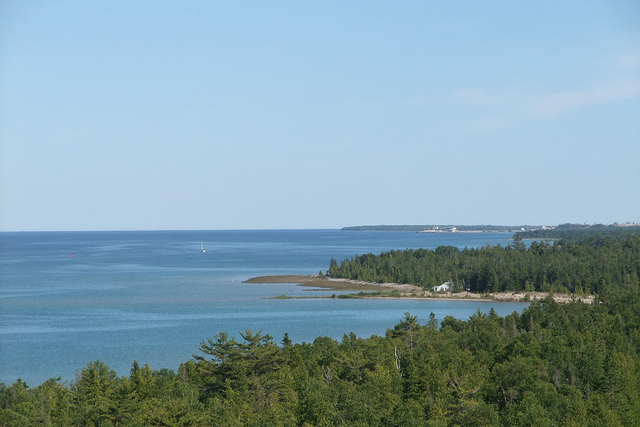The Council of Canadians has joined with one hundred other public interest groups to call on Ontario Premier Kathleen Wynne to direct Ontario Power Generation, which is wholly owned by the Government of Ontario, to withdraw its proposal to bury 200,000 cubic metres of low- and intermediate-level radioactive waste near Lake Huron.
This open letter follows a federal panel approval last week of the proposed disposal. If the project isn’t withdrawn and is approved next by the Harper government, nuclear waste that is considered hazardous for hundreds of thousands of years would be stored just hundreds of metres from the Great Lakes, the source of drinking water for about 40 million people in two countries. It is expected that in about four months time — so around early September, just prior to the October 19 election — federal Environment Minister Leona Aglukkaq could make her decision on the project.
The letter states, “We are writing to the Government of Ontario, as the sole shareholder of the proponent, Ontario Power Generation, to request that Ontario Power Generation be directed to withdraw its proposal and that the Government of Ontario initiate a needs assessment with respect to the storage and management of low, intermediate and high level radioactive wastes at OPG owned and/or operated reactors.”
Blackburn News reports on the letter and highlights, “Radioactive waste specialist Kevin Kamps of the U.S. based group, Beyond Nuclear, says it makes no sense to bury the waste out of reach in hopes to keep the radiation isolated for hundreds of thousands of years. He claims the federal panel accepted Ontario Power Generation’s testimony that Lake Huron would be large enough to dilute radioactive wastes if they leaked from the repository.” He says, “That a federal hearing panel would accept using the Great Lakes for the dilution of radioactive pollution as a solution to the industry’s waste management problems robs their report of any credibility.”
The Council of Canadians stands in solidarity with the Anishinabek Nation, which represents 39 First Nations in Ontario and which opposes the nuclear waste dump. Grand Council Chief Patrick Madahbee says that according to the United Nations Declaration on the Rights of Indigenous Peoples any burial of hazardous materials requires the free, informed, prior consent of nearby First Nations. The proposed waste site would be located on the traditional territory of the Saugeen Ojibway Nation. Saugeen Chief Vernon Roote opposes the waste site and says, “If something were to happen with the disposal or the leakage of nuclear waste I wouldn’t want to be drinking the water downstream.”
We have also called for the Great Lakes to be declared a commons, public trust and protected bio-region. In the report titled Our Great Lakes Commons: A People’s Plan to Protect the Great Lakes Forever, Council of Canadians chairperson Maude Barlow highlighted the threat that nuclear power poses to the Great Lakes. She has also commented, “I don’t know how to say this other than this is an act of insanity, this would be a crime against future generations, this is a crime against nature. We know what’s in this nuclear waste… and to even conceive burying it within one kilometre of these lakes is absolutely the most terrible idea I can think of.”
For more on our Great Lakes campaign, please click here.
Photo: NOAA Great Lakes Environmental Research Laboratory/flickr



